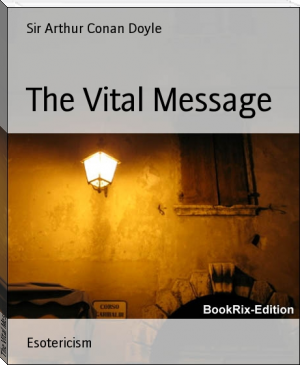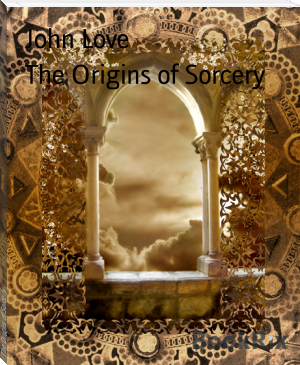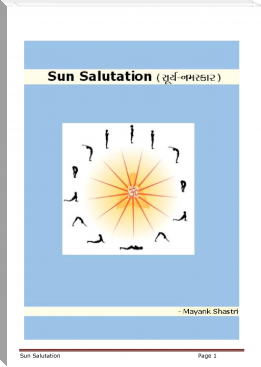The Vital Message - Sir Arthur Conan Doyle (story books for 5 year olds txt) 📗

- Author: Sir Arthur Conan Doyle
Book online «The Vital Message - Sir Arthur Conan Doyle (story books for 5 year olds txt) 📗». Author Sir Arthur Conan Doyle
partial exclusion of the beautiful lesson of His life. Far too much weight has been placed upon the one, and far too little upon the other, for the death, beautiful, and indeed perfect, as it was, could be matched by that of many scores of thousands who have died for an idea, while the life, with its consistent record of charity, breadth of mind, unselfishness, courage, reason, and progressiveness, is absolutely unique and superhuman. Even in these abbreviated, translated, and second-hand records we receive an impression such as no other life can give--an impression which fills us with utter reverence. Napoleon, no mean judge of human nature, said of it: "It is different with Christ. Everything about Him astonishes me. His spirit surprises me, and His will confounds me. Between Him and anything of this world there is no possible comparison. He is really a being apart. The nearer I approach Him and the closer I examine Him, the more everything seems above me."
It is this wonderful life, its example and inspiration, which was the real object of the descent of this high spirit on to our planet. If the human race had earnestly centred upon that instead of losing itself in vain dreams of vicarious sacrifices and imaginary falls, with all the mystical and contentious philosophy which has centred round the subject, how very different the level of human culture and happiness would be to-day! Such theories, with their absolute want of reason or morality, have been the main cause why the best minds have been so often alienated from the Christian system and proclaimed themselves materialists. In contemplating what shocked their instincts for truth they have lost that which was both true and beautiful. Christ's death was worthy of His life, and rounded off a perfect career, but it is the life which He has left as the foundation for the permanent religion of mankind. All the religious wars, the private feuds, and the countless miseries of sectarian contention, would have been at least minimised, if not avoided, had the bare example of Christ's life been adopted as the standard of conduct and of religion.
But there are certain other considerations which should have weight when we contemplate this life and its efficacy as an example. One of these is that the very essence of it was that He critically examined religion as He found it, and brought His robust common sense and courage to bear in exposing the shams and in pointing out the better path. THAT is the hall-mark of the true follower of Christ, and not the mute acceptance of doctrines which are, upon the face of them, false and pernicious, because they come to us with some show of authority. What authority have we now, save this very life, which could compare with those Jewish books which were so binding in their force, and so immutably sacred that even the misspellings or pen-slips of the scribe, were most carefully preserved? It is a simple obvious fact that if Christ had been orthodox, and had possessed what is so often praised as a "child-like faith," there could have been no such thing as Christianity. Let reformers who love Him take heart as they consider that they are indeed following in the footsteps of the Master, who has at no time said that the revelation which He brought, and which has been so imperfectly used, is the last which will come to mankind. In our own times an equally great one has been released from the centre of all truth, which will make as deep an impression upon the human race as Christianity, though no predominant figure has yet appeared to enforce its lessons. Such a figure has appeared once when the days were ripe, and I do not doubt that this may occur once more.
One other consideration must be urged. Christ has not given His message in the first person. If He had done so our position would be stronger. It has been repeated by the hearsay and report of earnest but ill-educated men. It speaks much for education in the Roman province of Judea that these fishermen, publicans and others could even read or write. Luke and Paul were, of course, of a higher class, but their information came from their lowly predecessors. Their account is splendidly satisfying in the unity of the general impression which it produces, and the clear drawing of the Master's teaching and character. At the same time it is full of inconsistencies and contradictions upon immaterial matters. For example, the four accounts of the resurrection differ in detail, and there is no orthodox learned lawyer who dutifully accepts all four versions who could not shatter the evidence if he dealt with it in the course of his profession. These details are immaterial to the spirit of the message. It is not common sense to suppose that every item is inspired, or that we have to make no allowance for imperfect reporting, individual convictions, oriental phraseology, or faults of translation. These have, indeed, been admitted by revised versions. In His utterance about the letter and the spirit we could almost believe that Christ had foreseen the plague of texts from which we have suffered, even as He Himself suffered at the hands of the theologians of His day, who then, as now, have been a curse to the world. We were meant to use our reasons and brains in adapting His teaching to the conditions of our altered lives and times. Much depended upon the society and mode of expression which belonged to His era. To suppose in these days that one has literally to give all to the poor, or that a starved English prisoner should literally love his enemy the Kaiser, or that because Christ protested against the lax marriages of His day therefore two spouses who loathe each other should be for ever chained in a life servitude and martyrdom--all these assertions are to travesty His teaching and to take from it that robust quality of common sense which was its main characteristic. To ask what is impossible from human nature is to weaken your appeal when you ask for what is reasonable.
It has already been stated that of the three headings under which reforms are grouped, the exclusion of the old dispensation, the greater attention to Christ's life as compared to His death, and the new spiritual influx which is giving us psychic religion, it is only on the latter that one can quote the authority of the beyond. Here, however, the case is really understated. In regard to the Old Testament I have never seen the matter treated in a spiritual communication. The nature of Christ, however, and His teaching, have been expounded a score of times with some variation of detail, but in the main as reproduced here. Spirits have their individuality of view, and some carry over strong earthly prepossessions which they do not easily shed; but reading many authentic spirit communications one finds that the idea of redemption is hardly ever spoken of, while that of example and influence is for ever insisted upon. In them Christ is the highest spirit known, the son of God, as we all are, but nearer to God, and therefore in a more particular sense His son. He does not, save in most rare and special cases, meet us when we die. Since souls pass over, night and day, at the rate of about 100 a minute, this would seem self-evident. After a time we may be admitted to His presence, to find a most tender, sympathetic and helpful comrade and guide, whose spirit influences all things even when His bodily presence is not visible. This is the general teaching of the other world communications concerning Christ, the gentle, loving and powerful spirit which broods ever over that world which, in all its many spheres, is His special care.
Before passing to the new revelation, its certain proofs and its definite teaching, let us hark back for a moment upon the two points which have already been treated. They are not absolutely vital points. The fresh developments can go on and conquer the world without them. There can be no sudden change in the ancient routine of our religious habits, nor is it possible to conceive that a congress of theologians could take so heroic a step as to tear the Bible in twain, laying one half upon the shelf and one upon the table. Neither is it to be expected that any formal pronouncements could ever be made that the churches have all laid the wrong emphasis upon the story of Christ. Moral courage will not rise to such a height. But with the spiritual quickening and the greater earnestness which will have their roots in this bloody passion of mankind, many will perceive what is reasonable and true, so that even if the Old Testament should remain, like some obsolete appendix in the animal frame, to mark a lower stage through which development has passed, it will more and more be recognised as a document which has lost all validity and which should no longer be allowed to influence human conduct, save by way of pointing out much which we may avoid. So also with the teaching of Christ, the mystical portions may fade gently away, as the grosser views of eternal punishment have faded within our own lifetime, so that while mankind is hardly aware of the change the heresy of today will become the commonplace of tomorrow. These things will adjust themselves in God's own time. What is, however, both new and vital are those fresh developments which will now be discussed. In them may be found the signs of how the dry bones may be stirred, and how the mummy may be quickened with the breath of life. With the actual certainty of a definite life after death, and a sure sense of responsibility for our own spiritual development, a responsibility which cannot be put upon any other shoulders, however exalted, but must be borne by each individual for himself, there will come the greatest reinforcement of morality which the human race has ever known. We are on the verge of it now, but our descendants will look upon the past century as the culmination of the dark ages when man lost his trust in God, and was so engrossed in his temporary earth life that he lost all sense of spiritual reality.
CHAPTER II
THE DAWNING OF THE LIGHT
Some sixty years ago that acute thinker Lord Brougham remarked that in the clear sky of scepticism he saw only one small cloud drifting up and that was Modern Spiritualism. It was a curiously inverted simile, for one would surely have expected him to say that in the drifting clouds of scepticism he saw one patch of clear sky, but at least it showed how conscious he was of the coming importance of the movement. Ruskin, too, an equally agile mind, said that his assurance of immortality depended upon the observed facts of Spiritualism. Scores, and indeed hundreds, of famous names could be quoted who have subscribed the same statement, and whose support would dignify any cause upon earth. They are the higher peaks who have been the first to catch the light, but the dawn will spread until none are too lowly to share it. Let us turn, therefore, and inspect this movement which is most certainly destined to revolutionise human thought and action as none other has done within the Christian era.
It is this wonderful life, its example and inspiration, which was the real object of the descent of this high spirit on to our planet. If the human race had earnestly centred upon that instead of losing itself in vain dreams of vicarious sacrifices and imaginary falls, with all the mystical and contentious philosophy which has centred round the subject, how very different the level of human culture and happiness would be to-day! Such theories, with their absolute want of reason or morality, have been the main cause why the best minds have been so often alienated from the Christian system and proclaimed themselves materialists. In contemplating what shocked their instincts for truth they have lost that which was both true and beautiful. Christ's death was worthy of His life, and rounded off a perfect career, but it is the life which He has left as the foundation for the permanent religion of mankind. All the religious wars, the private feuds, and the countless miseries of sectarian contention, would have been at least minimised, if not avoided, had the bare example of Christ's life been adopted as the standard of conduct and of religion.
But there are certain other considerations which should have weight when we contemplate this life and its efficacy as an example. One of these is that the very essence of it was that He critically examined religion as He found it, and brought His robust common sense and courage to bear in exposing the shams and in pointing out the better path. THAT is the hall-mark of the true follower of Christ, and not the mute acceptance of doctrines which are, upon the face of them, false and pernicious, because they come to us with some show of authority. What authority have we now, save this very life, which could compare with those Jewish books which were so binding in their force, and so immutably sacred that even the misspellings or pen-slips of the scribe, were most carefully preserved? It is a simple obvious fact that if Christ had been orthodox, and had possessed what is so often praised as a "child-like faith," there could have been no such thing as Christianity. Let reformers who love Him take heart as they consider that they are indeed following in the footsteps of the Master, who has at no time said that the revelation which He brought, and which has been so imperfectly used, is the last which will come to mankind. In our own times an equally great one has been released from the centre of all truth, which will make as deep an impression upon the human race as Christianity, though no predominant figure has yet appeared to enforce its lessons. Such a figure has appeared once when the days were ripe, and I do not doubt that this may occur once more.
One other consideration must be urged. Christ has not given His message in the first person. If He had done so our position would be stronger. It has been repeated by the hearsay and report of earnest but ill-educated men. It speaks much for education in the Roman province of Judea that these fishermen, publicans and others could even read or write. Luke and Paul were, of course, of a higher class, but their information came from their lowly predecessors. Their account is splendidly satisfying in the unity of the general impression which it produces, and the clear drawing of the Master's teaching and character. At the same time it is full of inconsistencies and contradictions upon immaterial matters. For example, the four accounts of the resurrection differ in detail, and there is no orthodox learned lawyer who dutifully accepts all four versions who could not shatter the evidence if he dealt with it in the course of his profession. These details are immaterial to the spirit of the message. It is not common sense to suppose that every item is inspired, or that we have to make no allowance for imperfect reporting, individual convictions, oriental phraseology, or faults of translation. These have, indeed, been admitted by revised versions. In His utterance about the letter and the spirit we could almost believe that Christ had foreseen the plague of texts from which we have suffered, even as He Himself suffered at the hands of the theologians of His day, who then, as now, have been a curse to the world. We were meant to use our reasons and brains in adapting His teaching to the conditions of our altered lives and times. Much depended upon the society and mode of expression which belonged to His era. To suppose in these days that one has literally to give all to the poor, or that a starved English prisoner should literally love his enemy the Kaiser, or that because Christ protested against the lax marriages of His day therefore two spouses who loathe each other should be for ever chained in a life servitude and martyrdom--all these assertions are to travesty His teaching and to take from it that robust quality of common sense which was its main characteristic. To ask what is impossible from human nature is to weaken your appeal when you ask for what is reasonable.
It has already been stated that of the three headings under which reforms are grouped, the exclusion of the old dispensation, the greater attention to Christ's life as compared to His death, and the new spiritual influx which is giving us psychic religion, it is only on the latter that one can quote the authority of the beyond. Here, however, the case is really understated. In regard to the Old Testament I have never seen the matter treated in a spiritual communication. The nature of Christ, however, and His teaching, have been expounded a score of times with some variation of detail, but in the main as reproduced here. Spirits have their individuality of view, and some carry over strong earthly prepossessions which they do not easily shed; but reading many authentic spirit communications one finds that the idea of redemption is hardly ever spoken of, while that of example and influence is for ever insisted upon. In them Christ is the highest spirit known, the son of God, as we all are, but nearer to God, and therefore in a more particular sense His son. He does not, save in most rare and special cases, meet us when we die. Since souls pass over, night and day, at the rate of about 100 a minute, this would seem self-evident. After a time we may be admitted to His presence, to find a most tender, sympathetic and helpful comrade and guide, whose spirit influences all things even when His bodily presence is not visible. This is the general teaching of the other world communications concerning Christ, the gentle, loving and powerful spirit which broods ever over that world which, in all its many spheres, is His special care.
Before passing to the new revelation, its certain proofs and its definite teaching, let us hark back for a moment upon the two points which have already been treated. They are not absolutely vital points. The fresh developments can go on and conquer the world without them. There can be no sudden change in the ancient routine of our religious habits, nor is it possible to conceive that a congress of theologians could take so heroic a step as to tear the Bible in twain, laying one half upon the shelf and one upon the table. Neither is it to be expected that any formal pronouncements could ever be made that the churches have all laid the wrong emphasis upon the story of Christ. Moral courage will not rise to such a height. But with the spiritual quickening and the greater earnestness which will have their roots in this bloody passion of mankind, many will perceive what is reasonable and true, so that even if the Old Testament should remain, like some obsolete appendix in the animal frame, to mark a lower stage through which development has passed, it will more and more be recognised as a document which has lost all validity and which should no longer be allowed to influence human conduct, save by way of pointing out much which we may avoid. So also with the teaching of Christ, the mystical portions may fade gently away, as the grosser views of eternal punishment have faded within our own lifetime, so that while mankind is hardly aware of the change the heresy of today will become the commonplace of tomorrow. These things will adjust themselves in God's own time. What is, however, both new and vital are those fresh developments which will now be discussed. In them may be found the signs of how the dry bones may be stirred, and how the mummy may be quickened with the breath of life. With the actual certainty of a definite life after death, and a sure sense of responsibility for our own spiritual development, a responsibility which cannot be put upon any other shoulders, however exalted, but must be borne by each individual for himself, there will come the greatest reinforcement of morality which the human race has ever known. We are on the verge of it now, but our descendants will look upon the past century as the culmination of the dark ages when man lost his trust in God, and was so engrossed in his temporary earth life that he lost all sense of spiritual reality.
CHAPTER II
THE DAWNING OF THE LIGHT
Some sixty years ago that acute thinker Lord Brougham remarked that in the clear sky of scepticism he saw only one small cloud drifting up and that was Modern Spiritualism. It was a curiously inverted simile, for one would surely have expected him to say that in the drifting clouds of scepticism he saw one patch of clear sky, but at least it showed how conscious he was of the coming importance of the movement. Ruskin, too, an equally agile mind, said that his assurance of immortality depended upon the observed facts of Spiritualism. Scores, and indeed hundreds, of famous names could be quoted who have subscribed the same statement, and whose support would dignify any cause upon earth. They are the higher peaks who have been the first to catch the light, but the dawn will spread until none are too lowly to share it. Let us turn, therefore, and inspect this movement which is most certainly destined to revolutionise human thought and action as none other has done within the Christian era.
Free e-book «The Vital Message - Sir Arthur Conan Doyle (story books for 5 year olds txt) 📗» - read online now
Similar e-books:





Comments (0)